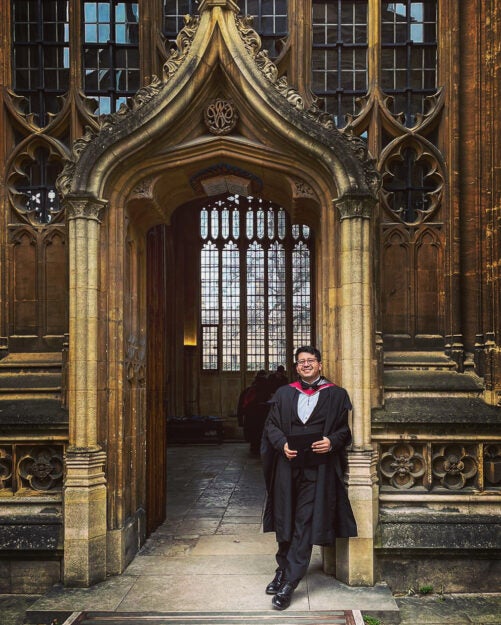When did you join the HSIL and what’s your role?
I joined the HSIL in August 2023 as a senior associate.
Can you tell us more about your work?
I was privileged to lead the organizing team of our 2023 Health Systems Innovation Hackathon focused on Latin America and the Caribbean. We partnered with leading institutions in Brazil, Mexico, Colombia, and Perú, and three global health institutions. Together we were able to host more than 700 participants from 34 countries. We selected ten outstanding teams that are now in the HSIL Venture Incubation Program that I also have the honor to coordinate.
I also have the opportunity of doing research. With the mentorship of Prof. Atun and colleague Dr. Che Reddy, I have been part of a project that explores how G-20 countries are transitioning into High-Value Health Systems. I love learning about how different health systems face the many challenges of providing care to those in need, so this project has been one of the most exciting ones I have worked on.
Finally, I’m supporting the Lab in multiple activities related to health system innovation for cancer control in Latin America. Through this project, we have sought opportunities to foster innovative transformation in our health systems. We are now building a learning network to share experiences between experts and leaders in the region and supporting the implementation of an innovation lab in Brazil.
Can you tell us more about your background?
My interest in health began when I crashed in the course of my best friend during undergrad. He was in medical school, and I went to his class on ethics. There, a justice of the Constitutional Court was invited to discuss the right to health. It was such an inspiring talk that I became obsessed with how health systems work and with their many challenges. I decided to major in Law and became a Lawyer. My first job was in the Ministry of Health of Colombia, where I worked on many issues regarding access to medicines in our country. I then co-founded the Environmental and Public Health Law Clinic in my alma mater, Universidad de los Andes, where we participated in significant cases before the Constitutional Court.
I wanted to learn more about health systems worldwide, so I got the fantastic chance of being accepted into the Harvard T.H. Chan School of Public Health, where I got my MPH in Global Health. I met amazing people and professors and had the opportunity of joining the World Health Organization as an intern in Japan. I even went to Mexico for a course to work on a short project for the Mexican Institute of Social Security. Unbelievable experience.
After finishing my program, I returned to Colombia to join Dejusticia, a human rights think tank. I joined the team as a researcher to investigate policies to promote a healthy food environment and safer vehicles. It was great because I explored many different social determinants of health. After a couple of years, I left to pursue an MBA at the University of Oxford in the UK and to start working as an independent consultant in global health. So far, I have explored the inequity of COVID-19 vaccines acquisition in Latin America for Oxfam, the falsification of pharmaceuticals in Colombia for the U4 Anti-Corruption Resource Centre, and the opportunities of fintech to promote Universal Health Coverage in Latin America for Access Health International.
I also teach courses on global health law and governance at the Universidad de los Andes School of Law and the Universidad del Rosario School of Medicine, both in Colombia.
Why did you decide on working in global health systems / healthcare innovation?
Health systems are such a strong driver for social justice. When communities are healthier, they are exposed to many more opportunities to enjoy a happy life. Yet, they must face many external and internal forces to provide quality and affordable care. We can better learn and improve by exploring what health systems are doing, good and bad. I learned more about health system innovation thanks to Prof. Atun and became passionate about it. There are many experiences of impressive teams and projects, and so many leaders and practitioners interested in learning and implementing ideas. I believe it is a great field to work in.
What do you like most about your work and the team?
So many. We have such a diverse team in many aspects. We come from different backgrounds and countries, yet we share so many things. We have a group of remarkable individuals with great experiences and abilities, all friendly and always willing to support you in anything you need. We support each other and we enjoy being around despite most of us working from different parts of the world. I love that I can also work with students excited to learn more about health systems while we learn from each other and the projects we are involved in. It has been a tremendous experience. Working on something you love with a unique, talented team is a real privilege.
What are your goals for your time at the Lab?
Learn as much as I can. I remember having a conversation with Prof. Atun about my career objectives, and I told him I wanted to become an expert in health systems in Latin America. He asked me why I just focus on Latin America when so many exciting cases are happening worldwide. He was right. That, to me, became a personal challenge. I want to learn a lot in the Lab. I have so far, but there is plenty more to keep learning.
I also want to keep supporting the growth of the Lab as much as possible. Despite being active for only a few years, the Lab has already gained worldwide recognition among scholars and students. I would love to keep being part of its growth, as there are so many opportunities to influence its shape its identity.

